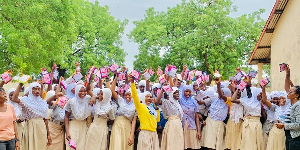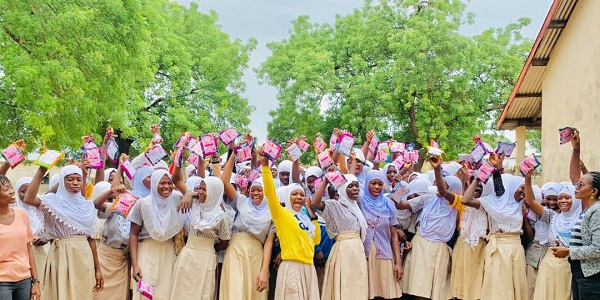 A photograph of students who have received free sanitary pads
A photograph of students who have received free sanitary pads
A total of 137 students from four basic schools in the Builsa South District of the Upper East Region have, on behalf of their peers, presented a petition to President John Dramani Mahama, requesting clarity on the government’s Free Sanitary Pad Policy.
The students are advocates and club members of the One Million Smiles Project, being implemented by Afrikids Ghana, a child rights organisation, in the district.
They marched through the Fumbisi Market with placards, raising awareness on menstrual hygiene before proceeding to the Builsa South District Assembly, where they formally presented a petition to the District Chief Executive (DCE) for onward submission to the President.
The presentation of the petition formed part of activities marking World Menstrual Hygiene Day, aimed at breaking the silence, raising awareness, and combating the stigma surrounding menstruation.
The participating schools included Girls Model Junior High School, St. Peter and Paul Basic School, English and Arabic Basic School, and the Preparatory Basic School.
The petition, read by Miss Nadia Ahmed of Girls Model Junior High School, commended the government for introducing the Free Sanitary Pad Policy, describing it as a step in the right direction towards improving menstrual hygiene and promoting gender equality in education.
However, the students called for clarification and transparency regarding the funding, implementation, and monitoring of the initiative.
They requested specific information on the source of funding for the policy—whether it would be drawn from the national budget, support from international partners, or other mechanisms. They also sought assurances regarding the policy’s long-term sustainability.
On eligibility, the petitioners inquired whether the policy would benefit only school-going girls or also include out-of-school girls and other vulnerable women, and asked for clear criteria to determine who qualifies for support.
Regarding the duration and frequency of distribution, the students requested information on whether sanitary pads would be provided monthly, termly, or otherwise. They also inquired whether a monitoring and evaluation framework had been established to ensure transparency, equity, and efficiency in distribution.
They called for the involvement of key stakeholders—including civil society organisations, school authorities, healthcare workers, and community leaders—in the implementation process.
Receiving the petition, Anne Musah, the Builsa South DCE, commended the students for their zeal in advocating for the welfare of the girl child. She assured them that their concerns would be forwarded to the President.
She, however, indicated that the implementation of the policy had begun, and beneficiaries in the district would soon receive their share, as the President was committed to ensuring that no student stays out of school due to lack of access to hygiene products.
Valeria Abakisi, the District Manager for the One Million Smiles Project, Afrikids Ghana, lauded the initiative. She emphasised that one of the major causes of absenteeism among adolescent girls was the lack of access to sanitary products.
“Under the One Million Smiles Project, Afrikids is helping these students to make their own reusable sanitary pads. If the Free Sanitary Pad Policy is implemented, it would complement these efforts and take the burden off parents. We, as civil society organisations, can then channel our resources toward educating them on how to use and manage the products,” she added.
Rubama Yahaya, Health Promotion Officer and District Adolescent Health Coordinator, noted that except for support from benevolent organisations such as Afrikids Ghana, the Queen Mother of Fumbisi, and herself, who often provided sanitary pads to girls, there was no formal policy in place. Therefore, the implementation of the Free Sanitary Pad Policy was timely and commendable.


